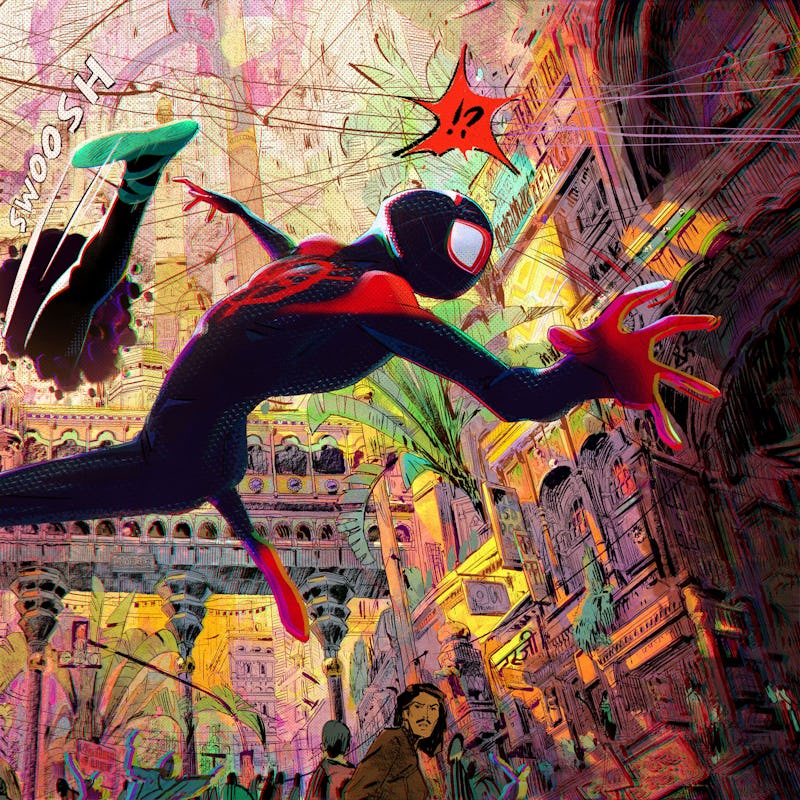Spider-Man: Across the Spider-Verse Makes the Multiverse Cool Again
In a time when the multiverse feels stale, Across the Spider-Verse unearths the last bits of electricity left to impress.

It was always going to be nearly impossible to follow up a movie as bold as Spider-Man: Into the Spider-Verse.
The Oscar-winning crowd-pleaser was such a disruptive force to the superhero industrial complex that it still feels like the ink is only drying on its comic book-style aesthetics five years after its release. So it’s nothing short of a miracle that Spider-Man: Across the Spider-Verse is dazzling and delightful entirely on its own terms, even when it doesn’t meet all of the loftiest expectations set by its innovative predecessor.
Due in theaters June 2 with mostly the same creative team from 2018 — directed by Joaquim Dos Santos, Kemp Powers, and Justin K. Thompson; with a script by David Callaham, Phil Lord, and Christopher Miller — the sequel lives up to the titles of Spider-Man’s numerous comics: Amazing, spectacular, sensational. It’s a piece of mainstream art maximalism that maintains the previous film’s infectious humor and psychedelia dynamism, now with a more ambitious if also unwieldy story. It is less a replay of the first movie and more a remix in its continuation of Brooklyn superhero Miles Morales (voiced by Shameik Moore). The beats and rhythms are familiar, but Spider-Man: Across the Spider-Verse is unquestionably a different track that tries to vibe to something new.
Half multiverse epic, half teen romance are the ingredients that make up Spider-Man: Across the Spider-Verse.
Spider-Man: Across the Spider-Verse picks up roughly a year after the original. After getting bit by a radioactive spider (you know the story), he’s settling into his role as Spider-Man but struggling to balance life as a superhero with his high school responsibilities. Meanwhile, in her own impressionist-painted universe, Gwen Stacy (Hailee Steinfeld) is struggling with Spider-Woman issues of her own and ultimately chooses to flee into the multiverse with a squad of Spider-People working to contain cross-dimensional abnormalities. When Gwen is sent on a secret mission to Miles’ universe, she seeks him out, sparking an adventure across the Spider-Verse that reveals a dark truth about Miles Morales and what it really means to be a friendly neighborhood Spider-Man.
At its core, Across the Spider-Verse is an emotional odyssey about fate, and the battle between what is supposed to happen versus what you alone determine will. It ventures far and wide into the multiverse for the souls of its leads: Gwen and Miles, lovestruck teenagers separated by dimensions but whose shared story is woven with themes of destiny and disruption.
Comic book movies have long played ping pong with canon, taking extreme liberties from the comics when necessary while staying faithful to them when in doubt. Across the Spider-Verse muses on this contentious relationship. It posits the repeated traumas (think Uncle Ben) that shape Spider-Man’s story are ordained “canon events” that must happen to ensure Spider-Man — all of them — are the heroes we know and love.
Desperate to protect his family from canonical doom, Miles races to break from awful tradition, kicking off what is more or less the actual plot of Across the Spider-Verse, though it feels a tad loaded on the back end. You can practically split the movie in half with its villains. The first half introduces Spot (Jason Schwartzman), a deceptively scarier baddie than his novel powers of portal generation imply. The second unleashes Miguel O’Hara, aka Spider-Man 2099 (Oscar Isaac), the brooding anti-hero with a V-shaped frame and self-appointed leader of the multiverse’s Spider-Men and Spider-Women (and Spider-Cats, and Spider-Dinos).
Vivid, neon sci-fi aesthetics bombard Across the Spider-Verse to feel unlike any other Spider-Man movie yet, even in contrast to the 2018 predecessor.
Between the teens’ troubled romance and two antagonists who are barely entangled across the full runtime, Across the Spider-Verse feels like two or three different movies playing simultaneously despite labored efforts to tell a single, coherent narrative. It’s a damning thing that an otherwise bold creative decision — different art styles ripped straight from the comics for every multiverse — can foster an inconsistent viewing experience.
Thankfully present to hold consistency like webbing is the shared narrative of Miles and Gwen, who now have more equal standing as co-protagonists. The movie’s script wisely emphasizes both of its leads’ strained relationships with their parents, as well as their universally understood inability to confess feelings for each other. It’s with their relationship that the movie slows down from sensory onslaught to look inward. In messy apartment bedrooms and upside-down views of cityscapes, Spider-Man: Across the Spider-Verse spends as much time relishing quiet contemplation as it does bristling multiverse action. There’s a distinct balance of polarizing energies that isn’t exactly zen but nevertheless makes for a unique experience in direct contrast to the momentum-driven Into the Spider-Verse.
Even when not at all expectations set by Into the Spider-Verse are met, Across the Spider-Verse nimbly weaves an intricate all-ages blockbuster with rare style and aplomb. It is both magnificent and exhausting, sometimes all at once. While a confirmed threequel will be the one to actually make what feels like an impossible landing, for now, Across the Spider-Verse swings above even the loftiest expectations that even its faults — a busybody plot, a baffling cliffhanger, and the sorely felt absence of transcendent set-pieces with masterful needle drops — aren’t enough to collapse this delicate interpretation of Spider-Man’s mythology. In a time when the multiverse is now too stale of a premise, these animated Spider-Man movies impossibly unearth the last bits of electricity left to impress.
Spider-Man: Across the Spider-Verse swings into theaters on June 2.
This article was originally published on